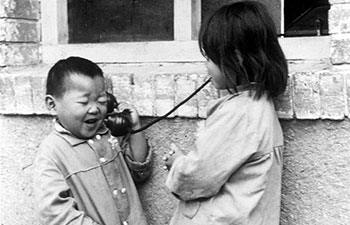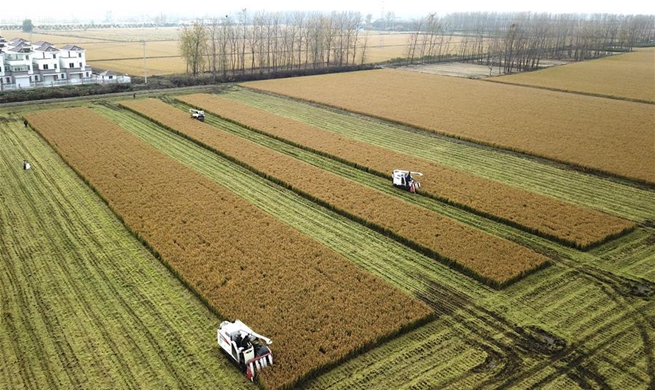NAIROBI, Nov. 13 (Xinhua) -- As December approaches, Simon Ochieng, a resident of Kisumu, western Kenya, knows too well that he must rush against time if he is to get good business from holidaymakers.
Ochieng, who has two homes in the county that borders Lake Victoria, has been sprucing up one of them hoping to cash in on merrymakers going for holiday in the region in December.
"My family lives in Nairobi after we moved there three years ago but all along, I had been working in Kisumu where I built the homes. I stay in one wherever I go up country and the other one I rent it out to people visiting the town and need homestay services," he said on Tuesday.
During the December holiday, Ochieng is hoping to cash in from domestic tourists just as he did during Easter and last year when he started the business.
"Currently, I have been planting a new lawn and then I will move to painting the walls. I must be done by end of the month so that it is ready for occupation next month," he said.
The accountant is among a growing list of Kenyans with houses in the countryside who are renting them out to holidaymakers that want to "stay home away from home".
The houses, many of them palatial and built due to cultural beliefs in the countryside, have been staying "idle" for years as the owners live and work in Nairobi, Mombasa and other towns.
But a boom in domestic tourism, thanks to county government efforts to revive some tourist attraction sites in their regions, has brought new tidings to owners of the houses.
The stone houses dot villages across the East African nation, from Elgeyo Marakwet and Kericho in Rift Valley to Siaya and Kakamega in the west and Kitui and Makueni in eastern.
The beautiful bungalows and maisonettes have been called by economists "dead capital" because owners only stay in them once a year when they visit in December with their families, yet they use huge sums of money to construct them.
"Last December, I rented out my home to a family of five and they stayed in for two weeks offering me 24,000 shillings (about 235 U.S. dollars). It was a good deal that I would not let go this December," said Gilbert Wandera, who sells computers in the capital Nairobi.
He has two homes in the countryside, one in Kitale - the latest and another one in Busia, which he had initially built. He rents out the home in the border town of Busia, a practice that he started two years.
"Business only booms in December because that is when people visit their rural homes. Last time I rented out to a family that had visited their parents but the man does not have a house at home," he said.
Owners of the homes furnish them with coaches and beddings and some even offer pay TV services to lure occupants, who live in them just as they would in their own houses - cooking for themselves.
Depending on the location, services offered, duration of stay and demand, charges start from 3,000 shillings (30 dollars) a day, but occupants prepare their own food.
Charges are higher at the Coast where the homestay services have taken the battle for customers to hotels.
"Anyone travelling to Nakuru with family and friends and needs a fully furnished can contact me. Charges extremely affordable," advertised Charles Too on social media as battle for customers among home owners starts to heat up.
Cytonn, a Nairobi-based investment firm, in a recent hospitality report, noted that tourist hotels in Kenya are losing market to serviced apartments as consumers look for bargains and their preferences and tastes change.
In Nairobi, serviced apartments in 2017 performed remarkably well, with average occupancies of 90 percent. The occupancy is 30 percent higher than that of hotels, according to Cytonn.
Antony Kuyo, a consultant with Avent Properties, said that the culture of building palatial homes in rural areas cannot end because the houses are a necessity even though they stay unoccupied most of the time.
"These are our traditions though it does not make sense to some people but as domestic tourism booms, the value of these homes is coming out because they are serving people where hotels are unavailable," he said.











